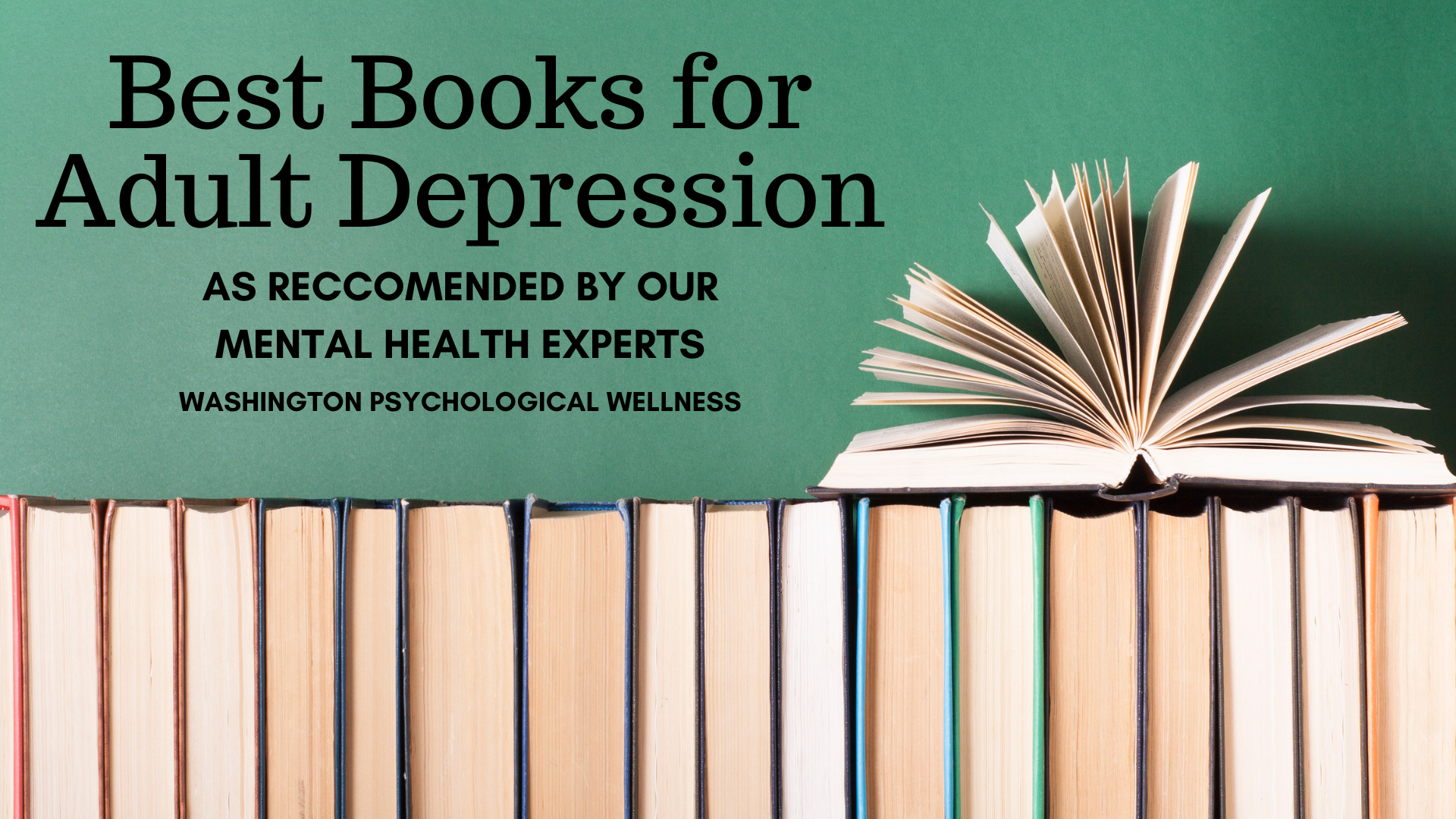
10 Best Books for Depression for Adults
At Washington Psychological Wellness, a psychotherapy center in Gaithersburg, MD, we get asked the question all the time. What are the best books for depression? Well, we asked our mental health clinicians and put together this list of recommended readings!
Want more recommended mental health book options? Check out our Books We Love section to discover a list of hand-picked resources!
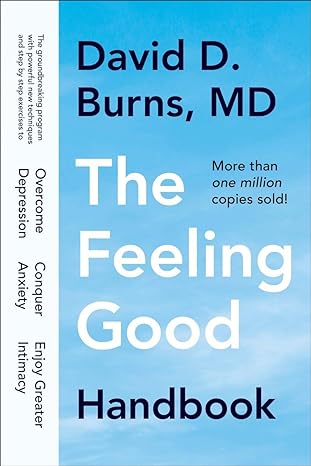
The Feeling Good Handbook
by David D. Burns
Best Books for Adult Depression
Summary
Dr. David D. Burns’ The Feeling Good Handbook is a classic in the field of cognitive-behavioral therapy (CBT) and has helped countless individuals overcome depression and anxiety. Burns, a pioneer of CBT, presents powerful tools and exercises designed to challenge negative thought patterns and replace them with healthier, more constructive ways of thinking.
The book is structured as a self-help manual, guiding readers through various CBT techniques, including mood tracking, thought records, and behavioral experiments. Burns explains how distorted thinking, such as all-or-nothing thinking or catastrophizing, can fuel depression, and he provides practical strategies for challenging and changing these patterns.
One of the key strengths of The Feeling Good Handbook is its accessibility. Burns breaks down complex psychological concepts into easy-to-understand steps, making the material approachable for readers at all levels. Whether you’re dealing with mild depression or seeking to manage more severe symptoms, this book offers valuable tools for improving your mental health and overall well-being.
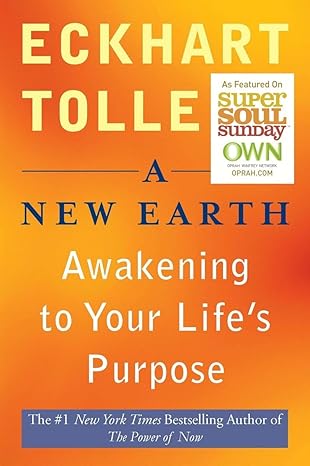
A New Earth: Awakening to Your Life’s Purpose
by Eckhart Tolle
Best Books for Adult Depression
Summary
In A New Earth, Eckhart Tolle explores the spiritual dimensions of depression and suffering, offering a transformative perspective on how to overcome negativity and find inner peace. Tolle, a renowned spiritual teacher, emphasizes the importance of living in the present moment and letting go of the ego, which he believes is the root cause of much of our pain and dissatisfaction.
The book guides readers through a journey of self-discovery and awakening, encouraging them to recognize the patterns of thought and behavior that contribute to their suffering. Tolle provides practical exercises for cultivating mindfulness and presence, which can help alleviate the symptoms of depression by shifting focus away from negative thoughts and towards a deeper sense of purpose and connection.
A New Earth is not a traditional self-help book, but rather a spiritual guide that invites readers to explore their inner world and transform their relationship with themselves and others. For those who resonate with Tolle’s teachings, this book can be a powerful tool for finding peace and healing in the midst of depression.
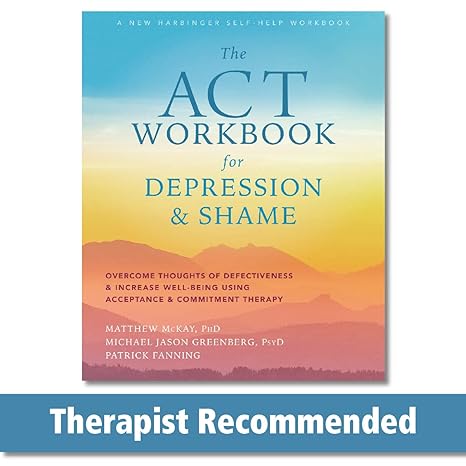
The ACT Workbook for Depression and Shame: Overcome Thoughts of Defectiveness and Increase Well-Being Using Acceptance and Commitment Therapy
by Matthew McKay, PhD, Michael Jason Greenberg, PsyD, and Patrick Fanning
Best Books for Adult Depression
Summary
The ACT Workbook for Depression and Shame introduces readers to Acceptance and Commitment Therapy (ACT), a mindfulness-based approach that focuses on accepting difficult emotions and committing to actions that align with personal values. This workbook is designed to help individuals who struggle with feelings of depression and shame, offering practical exercises for building self-compassion and resilience.
The authors, all experts in the field of psychology, guide readers through a series of exercises that help them identify and challenge negative self-beliefs, develop mindfulness skills, and take meaningful steps toward improving their well-being. The workbook format allows for active participation, making it a valuable resource for those who want to take an active role in their recovery.
One of the key strengths of ACT is its emphasis on living a meaningful life, even in the presence of difficult emotions. This approach can be particularly helpful for those dealing with chronic depression, as it encourages acceptance of one’s emotional experience while still pursuing personal goals and values. The ACT Workbook for Depression and Shame offers a compassionate and practical approach to managing depression and building a more fulfilling life.
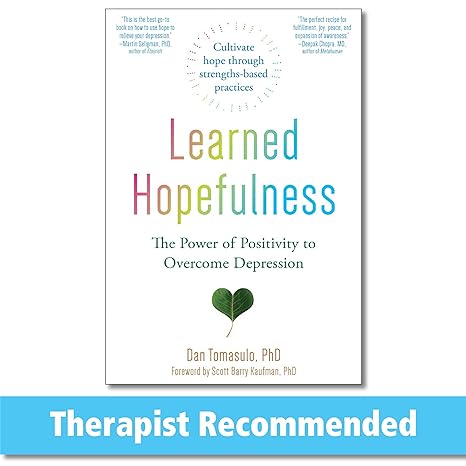
Learned Hopefulness: The Power of Positivity to Overcome Depression
by Dan Tomasulo, PhD, with Foreword by Scott Barry Kaufman, PhD
Best Books for Adult Depression
Summary
Learned Hopefulness by Dan Tomasulo, PhD, offers a fresh perspective on depression by focusing on the power of hope. Drawing on the principles of positive psychology, Tomasulo presents strategies for cultivating hope and resilience, which can help counteract the feelings of helplessness and despair that often accompany depression.
The book is filled with practical exercises and evidence-based techniques designed to boost positivity and improve mental health. Tomasulo explains how developing a hopeful mindset can lead to better outcomes in both mental and physical health, and he provides readers with tools for building hope through gratitude, goal-setting, and positive social connections.
One of the standout features of Learned Hopefulness is its emphasis on small, achievable steps. Tomasulo encourages readers to start with manageable goals and gradually build on their successes, fostering a sense of progress and empowerment. This approach makes the book accessible to those who may feel overwhelmed by their depression, offering a pathway to recovery that is both realistic and inspiring.
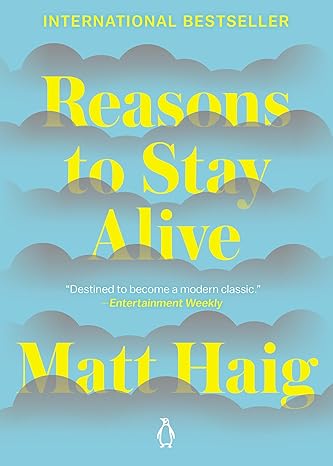
Reasons to Stay Alive
by Matt Haig
Best Books for Adult Depression
Summary
Reasons to Stay Alive is a deeply personal and moving memoir by Matt Haig, who shares his journey through depression and anxiety. Written with honesty and vulnerability, Haig’s book offers hope and encouragement to those who are struggling with similar challenges.
The book is divided into short, poignant chapters that explore Haig’s experiences with mental illness, as well as his reflections on life, love, and recovery. Haig’s writing is both relatable and comforting, as he speaks directly to the reader, offering reassurance that things can and do get better.
One of the key strengths of Reasons to Stay Alive is its accessibility. Haig’s writing is clear and straightforward, making the book an easy and comforting read for those who may be in the midst of a difficult time. The book also includes practical advice for managing depression, as well as reflections on the importance of finding meaning and connection in life. Reasons to Stay Alive is a powerful reminder that, even in the darkest moments, there is always hope.
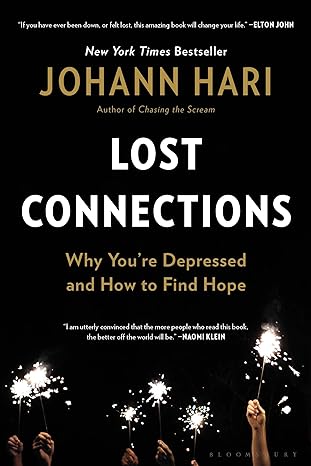
Lost Connections
by Johann Hari
Best Books for Adult Depression
Summary
In Lost Connections, Johann Hari explores the underlying causes of depression and challenges the conventional wisdom that it is purely a chemical imbalance in the brain. Drawing on extensive research and interviews with experts in the field, Hari argues that depression is often rooted in disconnection—from meaningful work, relationships, and a sense of purpose.
The book is divided into two parts: the first explores the causes of depression, while the second offers solutions for reconnecting with the aspects of life that bring joy and fulfillment. Hari advocates for a more holistic approach to mental health, one that addresses the social and environmental factors that contribute to depression.
One of the key strengths of Lost Connections is its emphasis on systemic change. Hari calls for a reevaluation of how society approaches mental health, urging readers to consider the broader context in which depression occurs. The book offers both a critique of the status quo and a hopeful vision for how we can create a world that supports mental well-being. Lost Connections is an eye-opening read for anyone interested in understanding the deeper roots of depression and finding new ways to address it.
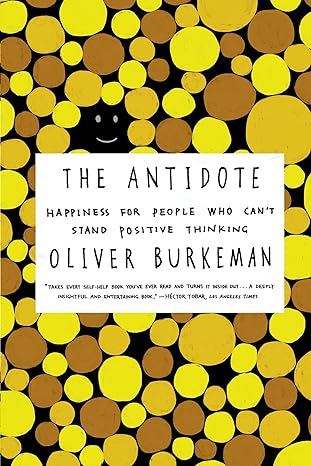
The Antidote: Happiness for People Who Can’t Stand Positive Thinking
by Oliver Burkeman
Best Books for Adult Depression
Summary
The Antidote by Oliver Burkeman offers a counterintuitive approach to happiness and mental well-being, challenging the idea that positive thinking is the key to overcoming depression. Instead, Burkeman advocates for embracing uncertainty, imperfection, and even negative emotions as a path to a more authentic and fulfilling life.
The book is a blend of philosophy, psychology, and self-help, drawing on the insights of thinkers such as Stoics, Buddhists, and existentialists. Burkeman explores how these perspectives can help us navigate the challenges of life, offering practical advice for finding peace in the midst of uncertainty and difficulty.
One of the key strengths of The Antidote is its skepticism of the traditional self-help industry. Burkeman encourages readers to question the pressure to always be positive and instead embrace a more balanced and realistic approach to life. The book is both thought-provoking and practical, making it a valuable resource for those who struggle with depression and are looking for an alternative to conventional positive thinking.
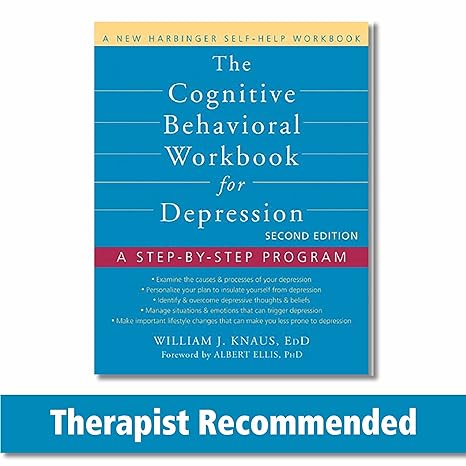
The Cognitive Behavioral Workbook for Depression: A Step-by-Step Program
by William J. Knaus, EdD, and Albert Ellis, PhD
Best Books for Adult Depression
Summary
The Cognitive Behavioral Workbook for Depression by William J. Knaus, EdD, and Albert Ellis, PhD, is a comprehensive self-help guide that offers a structured program for overcoming depression using cognitive-behavioral therapy (CBT). The workbook is designed to help readers identify and change the negative thought patterns that contribute to their depression, replacing them with more positive and constructive ways of thinking.
The book is filled with exercises, worksheets, and practical strategies that guide readers through the process of cognitive restructuring. Knaus and Ellis explain how distorted thinking, such as overgeneralization or catastrophizing, can fuel depression, and they provide step-by-step instructions for challenging and changing these thoughts.
One of the key strengths of this workbook is its emphasis on active participation. The exercises are designed to help readers take an active role in their recovery, making it a valuable resource for those who want to take charge of their mental health. Whether you’re working with a therapist or on your own, The Cognitive Behavioral Workbook for Depression offers powerful tools for managing and overcoming depression.
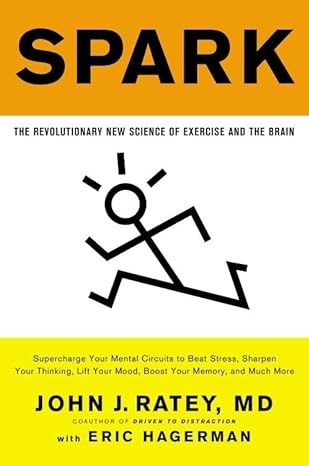
Spark: The Revolutionary New Science of Exercise and the Brain
by John J. Ratey, MD, with Eric Hagerman
Best Books for Adult Depression
Summary
In Spark, Dr. John J. Ratey explores the powerful connection between physical exercise and mental health, offering evidence that regular exercise can be as effective as medication for treating depression. Drawing on the latest research in neuroscience, Ratey explains how exercise can boost mood, improve cognitive function, and reduce the symptoms of depression and anxiety.
The book covers a wide range of topics, including the impact of exercise on the brain’s chemistry, the role of physical activity in preventing cognitive decline, and the benefits of exercise for managing stress and enhancing overall well-being. Ratey also provides practical advice for incorporating exercise into your daily routine, making it accessible to readers of all fitness levels.
One of the key strengths of Spark is its focus on the science behind the mind-body connection. Ratey presents compelling evidence that exercise is a powerful tool for improving mental health, and he offers readers practical strategies for harnessing its benefits. Whether you’re dealing with depression or simply looking to boost your mood and energy levels, Spark is an inspiring and informative read.
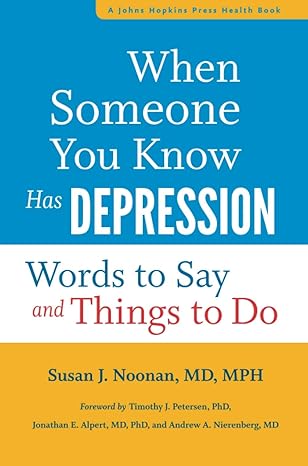
When Someone You Know Has Depression: Words to Say and Things to Do by Susan J. Noonan, with Forewords
by Timothy J. Petersen, Jonathan E. Alpert, and Andrew A. Nierenberg
Best Books for Adult Depression
Summary
When Someone You Know Has Depression by Susan J. Noonan is a compassionate guide for those who want to support a loved one with depression. Drawing on her own experiences as a physician and someone who has lived with depression, Noonan provides practical advice for how to offer meaningful help without becoming overwhelmed.
The book covers a wide range of topics, including how to recognize the signs of depression, how to communicate effectively with someone who is struggling, and how to encourage them to seek professional help. Noonan also offers strategies for managing your own emotions and well-being while supporting a loved one, emphasizing the importance of self-care.
One of the key strengths of this book is its focus on practical, actionable advice. Noonan provides specific examples of what to say and do in various situations, making it easier for readers to offer the right kind of support. When Someone You Know Has Depression is an invaluable resource for anyone who wants to be there for a loved one while also taking care of themselves.
About Washington Psychological Wellness
At Washington Psychological Wellness, our therapists have extensive training, experience, and insights to treat a wide variety of mood disorders, including depression. Our therapists specialize in helping clients manage the overwhelming symptoms of depression, such as persistent sadness, loss of interest in activities, and feelings of hopelessness. We understand that depression can deeply affect your daily life, relationships, and overall sense of well-being.
Depression treatment at Washington Psychological Wellness often includes developing personalized strategies to manage symptoms, improve mood, and build resilience. Our treatment modalities, such as cognitive-behavioral therapy (CBT), dialectical behavior therapy (DBT), and mindfulness-based therapy, are tailored to meet your specific needs and help you reclaim your life from depression.
Ready to seek depression counseling?
Contact us now to schedule your complimentary 15-minute initial consultation. Telehealth (online) therapy options are available.
